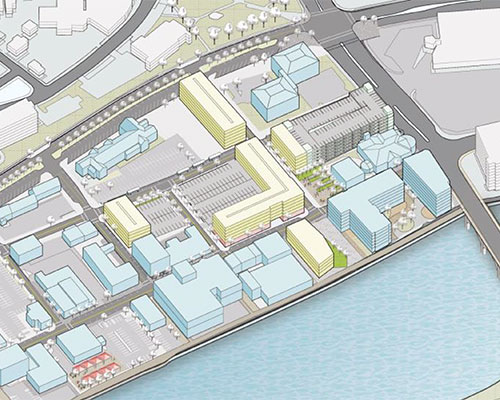One idea calls for replacing the Herbert H. Goecke Jr. Memorial Parking Deck with a combination of new housing, surface lots and a new garage. Bailey Boulevard would also be downgraded to a two-lane Bailey Street just as it was before urban renewal.
A vision for a revitalized Merrimack Street Transformative Development Initiative (TDI) is reaching “a third of the way through the planning process.” The plan suggests new residential-commercial development, extending or reconnecting cross-streets to the riverfront and added parking, including a replacement parking deck.
More than 50 people, including the mayor and several city councilors, attended a community update meeting Monday evening, held by a visioning team including Utile Architecture and Planning of Boston, quasi-public agency MassDevelopment and the city. The presentation drew from public input and walking tour observations started in September. Among the highlights, under a “preferred scenario,” a total 316 new housing units would be created along extensions of Haverhill Place and Park Way, as well as on existing portions of How and Merrimack street. Also, as part of a “phased parking plan,” a new multi-level, 588-space parking deck replacing the existing Herbert H. Goecke Memorial Parking Deck; and another 198 spaces at an open parking lot off Park Way. MassDevelopment Transformative Development Fellow Noah B. Koretz told WHAV the goal is to create “a vibrant Merrimack Street area with a successful downtown atmosphere” including riverfront access expansion.
“New residents, new businesses, a really robust atmosphere for businesses and people living and working downtown, what we call in the economic development world an 18-hour economy, Koretz said. “So you want positive street-level activity and commerce and things like that going on during the day, during the evening. A really active street.”
Koretz said a “multi-stage approach” would include short-term improvements as part of a longer-term urban design plan.
“We’re proposing everything from streetscape improvement and place making assets that can help bring people down to Merrimack Street, improve the atmosphere for people who are living and shopping on Merrimack Street right away. Everything from that, to more intermediate, smaller development to larger, long-term redevelopment there. The idea is that it sort of creates a mode roadmap going forward,” Koretz said.
Koretz also said a website being launched will provide public updates as the study progresses.
“We launched a web tool, ‘courb.co/haverhill.’ And that is a way for us to update the public online, post the feedback and discussions online. We’ll also be posting the intermediate material that comes out as we go on that website,” Koretz said.
The team’s next public session may be scheduled in late January or early February, Koretz said. According to presentation documents, upcoming work by the team includes using feedback from Monday’s meeting to “finalize development test fits,” apply market and traffic impacts of recommendations into final planning recommendations and “develop storefront and signage guidelines.”
Last April, Koretz was among three Transformative Development Intiative (TDI) Fellows hired by MassDevelopment to work in the gateway cities of Haverhill, Lynn and Springfield, which the agency selected last December as “pilot TDI Districts in Development.” They joined with gateway cities of Brockton, Holyoke, New Bedford, Peabody, Pittsfield, Revere and Worcester.

